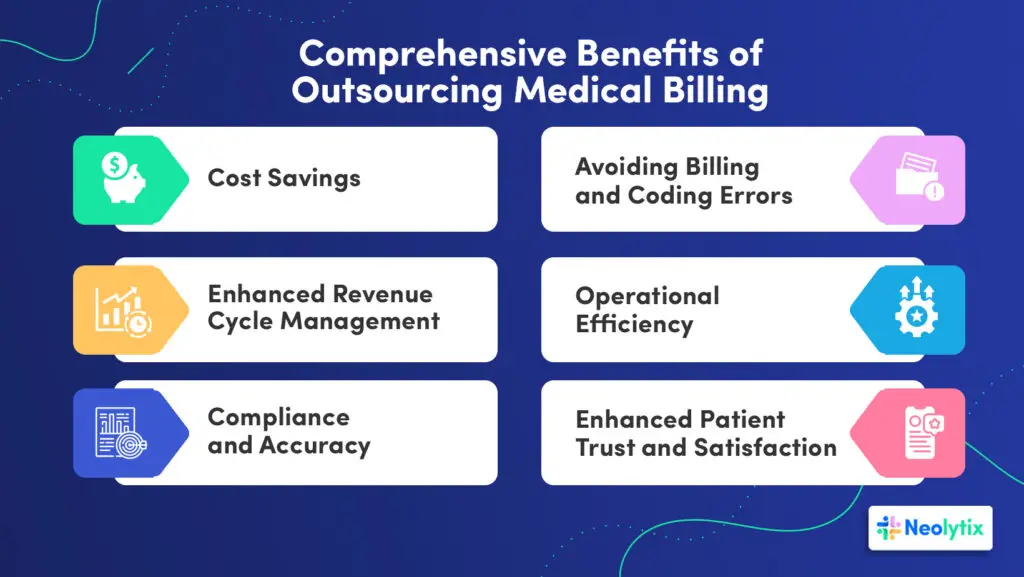As healthcare continues to advance, small medical practices face an uphill battle against growing administrative demands and the critical need for improved operational efficiency. This shift requires a reevaluation of traditional billing practices, highlighting the importance of precision and speed in medical billing processes.
Effective management of these elements is key to not only sustaining operations but also optimizing the overall financial health and service delivery in these dynamic times.
The Burdens of In-House Medical Billing
Here’s a brief look at the challenges small medical practices encounter through their in-house billing operations:
- Staffing Strains: Limited staff can lead to bottlenecks, especially when complex billing tasks pile up, demanding both time and expertise. And then there is also the labor shortage which leads to recruiting skilled billers more difficult.
- Error Prone Encounters: The risk of billing inaccuracies increases without specialized tools and training, potentially leading to frequent claim denials and revisions. Often, these billers lack the resources to do coding audits, too.
- Costly Systems: Maintaining state-of-the-art billing technology often proves costly, diverting funds from critical patient care services.
- Compliance Concerns: Staying abreast of constantly evolving healthcare regulations can be daunting for small practices. Non-compliance with billing regulations can result in hefty fines and legal consequences, adding unnecessary stress and financial strain.
- Time-Consuming Training: Training staff members on billing procedures and software can consume valuable time and resources. Moreover, staff turnover can exacerbate this issue, requiring constant retraining and onboarding, further hindering productivity and efficiency.
- Billing Backlogs: In-house billing departments often struggle with backlogs, especially during peak times or when staff members are absent. Delays in processing claims can lead to delayed payments, impacting the practice’s cash flow.
Exploring Outsourcing as a Viable Solution for Medical Billing
Outsourcing medical billing involves delegating billing processes to an external specialist to increase efficiency and reduce administrative overhead.
Contrary to common misconceptions, outsourcing does not mean losing control over your billing processes. To clarify how outsourcing can enhance operational efficiency compared to in-house processing, here’s a detailed comparison:
|
Feature |
In-House Billing |
Outsourcing |
|
Cost Efficiency |
High overhead costs due to staff salaries, training, and technology investments. |
Reduced overhead by leveraging the service provider’s resources and technology. |
|
Expertise and Compliance |
Dependent on the in-house team’s knowledge and ongoing training. |
Access to teams with specialized expertise and up-to-date compliance with regulations. |
|
Technology and Infrastructure |
Requires significant investment in billing software and hardware. |
Provider uses advanced technology, often with better security and efficiency. |
|
Focus on Core Services |
Staff may be overloaded with administrative tasks, detracting from patient care. |
Frees up the practice’s staff to focus more on patient care and less on administrative tasks. |
|
Scalability |
Scaling up requires significant resource allocation and time. |
Easier to scale operations with a service provider who can adjust resources as needed. |
Comprehensive Benefits of Outsourcing Medical Billing Service
The following most common benefits collectively contribute to a more streamlined, efficient, and financially secure practice, allowing healthcare providers to focus on enhancing patient care instead.
- Cost Savings: Outsourcing eliminates the need for an in-house billing department, significantly reducing overhead costs associated with salaries, training, and technology maintenance. This shift can free up resources that can be better invested in patient care or practice expansion.
- Enhanced Revenue Cycle Management: By outsourcing, practices benefit from specialized expertise in billing that ensures faster claim submissions and reduced incidences of claim denials. This leads to improved cash flow and quicker revenue realization.
- Compliance and Accuracy: Outsourced billing services stay abreast of the latest healthcare regulations, including HIPAA compliance, ensuring that billing practices meet all legal requirements. This compliance reduces the risk of costly legal issues and helps maintain the privacy and security of patient data.
- Avoiding Billing and Coding Errors: Professional billing companies use sophisticated medical billing software and skilled coders to reduce the likelihood of errors. Accurate coding minimizes the chances of claim rejections and denials, directly impacting the bottom line positively.
- Operational Efficiency: With the administrative burden of billing shifted to experts, healthcare providers can focus more on patient care and other core activities, improving overall practice performance and patient satisfaction.
- Enhanced Patient Trust and Satisfaction: Efficient billing processes and transparent communication from outsourcing firms can increase patient trust. Patients appreciate accurate and prompt billing experiences, which enhance their overall satisfaction with the healthcare provider.

Personalized Billing Solutions: Meeting Diverse Needs
Customization in Medical Billing
Medical billing needs vary greatly across different specialties, reflecting the unique challenges and requirements of each field. For instance, oncology practices must manage complex billing codes for chemotherapy administration, often involving multiple treatment phases and corresponding supportive care procedures.
In contrast, pediatric clinics frequently deal with routine developmental screenings and vaccinations, requiring different billing codes that may change based on age-specific guidelines.
Customized billing solutions are essential, ensuring that each practice can navigate its particular billing landscape effectively. These tailored systems adapt to the specific demands of various medical fields, enhancing both efficiency and accuracy in managing financial operations.
An example includes orthopedic practices, which might use billing solutions tailored for procedures like joint replacements and arthroscopies, requiring detailed post-op care billing.
Enhancing Patient Satisfaction and Compliance
Personalized billing solutions significantly boost patient satisfaction by streamlining billing processes, resulting in clearer and more accurate invoices. This transparency and efficiency not only foster a better patient-provider relationship but also simplify the compliance process with evolving healthcare regulations.
By reducing errors, making patient billing processes more responsive and enhancing understanding through customized billing, practices can build stronger trust with their patients, crucial for long-term engagement and satisfaction. Additionally, faster billing cycles lead to quicker resolutions of financial matters, further enhancing patient satisfaction and retention.
The Future of Medical Billing
The future of medical billing is set to be reshaped by advanced technologies like artificial intelligence (AI) and machine learning. These tools are not only expected to automate complex decision-making processes but also to significantly enhance the capabilities for fraud detection.
This progression promises more efficient operations, enabling faster, more accurate billing processes that reduce the incidence of errors and fraudulent claims.
Robotic Process Automation (RPA) in Medical Billing
Healthcare automation, also known as Robotic Process Automation (RPA), is revolutionizing the field of medical billing by automating repetitive and time-consuming tasks like data entry, claims processing, and compliance checks. This advanced technology significantly accelerates the billing cycle, enhancing productivity by allowing staff to focus on more complex issues and patient care.
More importantly, RPA minimizes human errors that can lead to claim denials and compliance issues, thereby ensuring higher accuracy in billing practices. With these improvements, healthcare providers can expect a smoother, faster, and more reliable billing process, which not only boosts operational efficiency but also improves the overall financial health of the practice.
“Also read: How Automated Solutions Revolutionize Medical Billing Efficiency”
Boost Revenue and Efficiency with Neolytix
Discover the potential of advanced billing solutions with Neolytix and how we can drive significant enhancements in operational efficiency and revenue transformation for your practice. Neolytix’s cutting-edge tools are designed to ensure accurate Medical Billing, effective denial management, and optimized revenue cycle management.
Contact us today to schedule a personalized consultation or demonstration of our services, tailored specifically to meet the needs of small practices looking to modernize their healthcare services and improve cash flow.
Get a Complementary Consultation for Medical Billing
"*" indicates required fields



